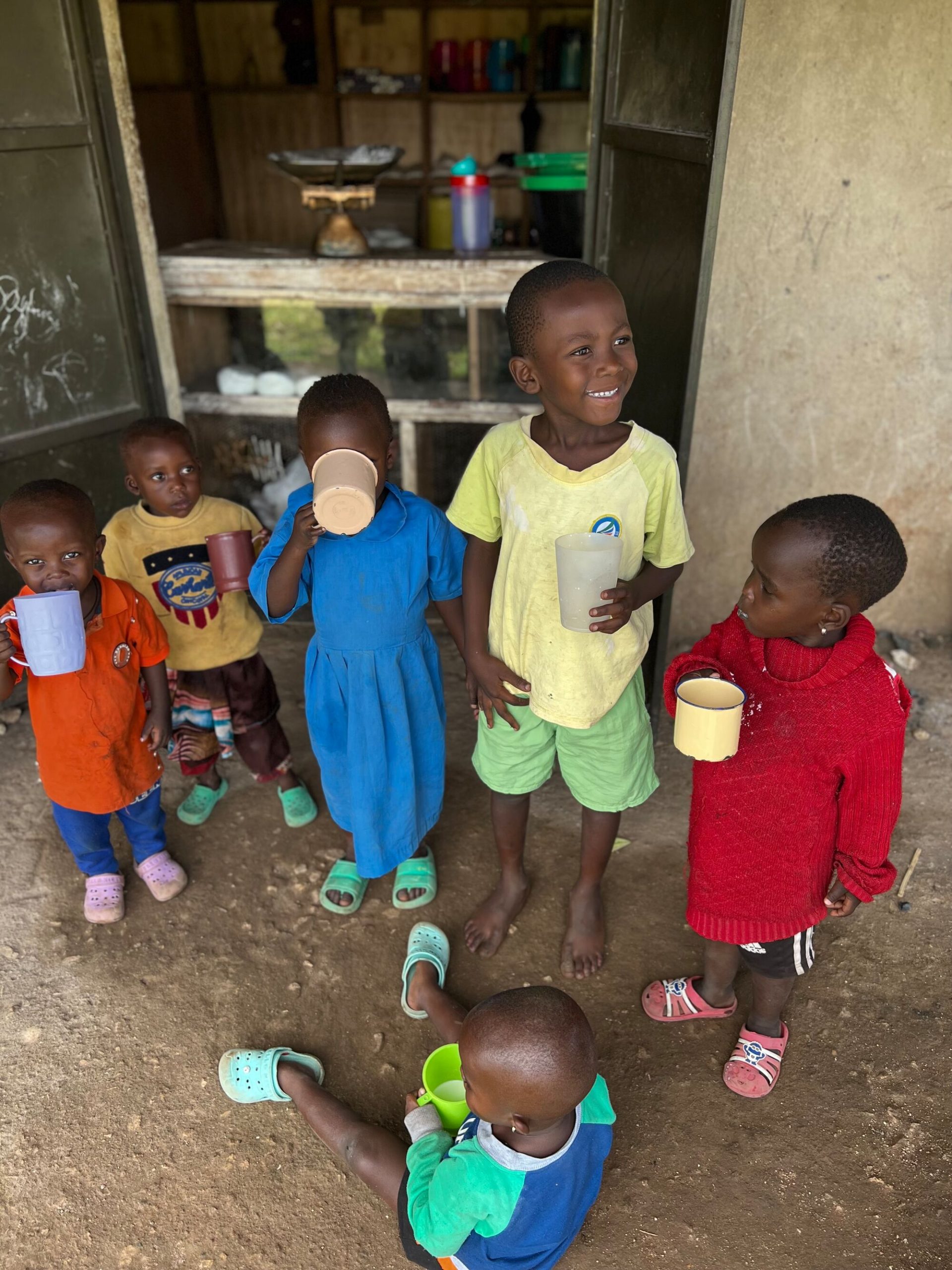MoreMilk and MoreHoney for Children in Uganda
The “MoreMilk” and “MoreHoney” for Children in Uganda aid projects, initiated by our founder Volkmar Wywiol, is an exemplary success in improving the nutritional underpinnings of children in East Uganda.

Every success of humanitarian activities depends on trustworthy partners on the spot, with their local knowledge and ability to check results. Elisabeth Mwaka has been living in Uganda for over 30 years. In all these years she has brought about remarkable development in Butiru through her constant hard work, undaunted efforts and intensive fundraising. She has established 46 schools, health clinics and homes for widows and orphans. In recognition of her achievements she was presented with the Bundesverdienstkreuz, the Federal Award of Merit.
THE REPUBLIC
OF UGANDA
The Republic of Uganda is a landlocked state in East Africa, with a population of approximately 46 million. It is situated on a plateau and borders on five other countries: South Sudan, Kenya, Tanzania, Ruanda and Congo. Its landscape and fauna are fascinating for their beauty. For a long time the country was under authoritarian rule, but more recently it has opened up to democratic processes. The average age is 15.7 years. Uganda is a country of very low incomes, with a rapidly growing population and widespread poverty.
The children of Butiru
Butiru is a small town and at the same time an administrative district, with numerous villages and 17,000 inhabitants. The food situation in this rural and mountainous area is difficult. Scanty harvests and an unbalanced diet result in a deficiency of vital vitamins and minerals in the children, many of whom are orphans. In addition, there are the many orphans who have lost their parents early in life through HIV infection and are being brought up by relatives. The situation has deteriorated further during the Covid pandemic. For instance, the children have been unable to attend school for nearly two years, with serious consequences. Many young people lack regular meals; in particular they have no access to basic foods like milk, which we take for granted.
„MOREMILK“:
A SIMPLE IDEA,
A HUGE INFLUENCE!
For poor people in Uganda, a milk cow is out of reach. Even with microfinancing buying one is scarcely possible, since the loan must be repaid at high interest. Our “MoreMilk” project is compellingly simple. It donates milk cows worth 300 euros each to mothers in Butiru. The two firstborn calves are given to other women. On average, these local zebus give about 1500 litres of milk a year. That’s enough to provide 8 to 10 children with a half litre each per day. Mixed into maize porridge in the morning, it gives kids a healthy breakfast.
The mothers can sell the extra milk to get a small additional income. Thus, our MoreMilk project provides two important and sustained benefits.
THE COWS AND BEEHIVES GO TO MOTHERS IN WOMEN’S GROUPS
For many years, Sister Elisabeth Mwaka and her team have successfully formed lasting women’s groups of about 20 people each. The primary focus is on imparting knowledge about farming, home economics, sewing, microfinancing and especially birth control. Today there are 118 women’s groups in the Butiru area with about 2500 members. Each of these mothers would like to have a milk cow. The cow delivery is a special holiday; the mothers dress their best for the occasion, and later thank each donor with a souvenir photo.
„MOREHONEY“:
THE MIRACLE OF BEES
The mothers receive two to four bee colonies for their own supply and for the personal sale of honey. However, the future professionally run beekeeping farm “Masabaland Honey Farm” of the organisation “Christian Social Work in Uganda” is at the centre of beekeeping. We have been given a 12,500 square metre plot of sloping land planted with eucalyptus, gruvera and tithonia. We are planning to set up 200 bee colonies here. Our aim is to set up this honey farm as a beekeeping training centre for the many poor women – Butiru Women Beekeepers. As a first step, we have already been able to set up 22 beehives on the site. Work has recently begun on fencing off the site and building a small work shed – in local clay construction – for equipment, honey extractor, packaging, storage and overnight accommodation.
MORE SUPPORTERS OF THE MOREMILK AND MOREHONEY PROJECT ARE VERY WELCOME!
Sister Elisabeth has been able to do her work in Uganda primarily through the support of the “Friends of Christian Social Work” in Hankensbüttel in Germany. Every donor gets a receipt for a charitable donation they can deduct from their taxes.
Donation account:
Butiru Freundeskreis
Volksbank Hankensbüttel
IBAN: DE07 2579 1635 0061 8870 00
Purpose of transfer: „MoreMilk“ or “MoreHoney” (Please state your full address for the donation receipt)
If you would like more information on sustainable developments in Uganda by the “Freundeskreis zur Förderung Christlicher Sozialarbeit e.V.” you can read about it at the link.
BECOME A COW AMBASSADOR TOO!
The project has attracted the interest not just of business associates, but also of employees of the Stern-Wywiol Gruppe, and motivated them to make their own donations. As Christina Dickel, Curator of the Stern-Wywiol Gallery, puts it, “The idea of MoreMilk is ingenious. A poor family will never be able to afford a cow on their own. Our donation goes directly to the mothers and their children. And it’s just nice to be part of it. Where else can you buy a cow as a team and do something good?” For a lot of cows, you need a lot of donors. We’re looking for multipliers for this beneficial project who act as cow ambassadors to their friends and acquaintances.